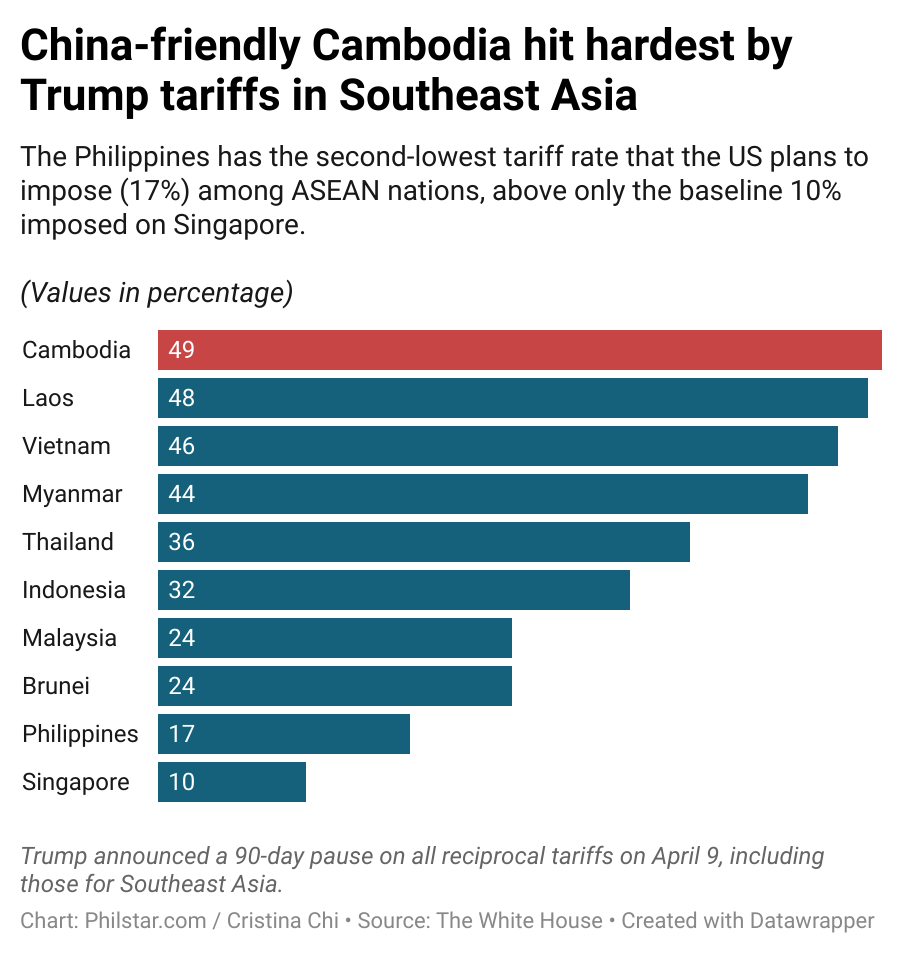
Upgrade to High-Speed Internet for only ₱1499/month!
Enjoy up to 100 Mbps fiber broadband, perfect for browsing, streaming, and gaming.
Visit Suniway.ph to learn
Cristina Chi - Philstar.com
April 10, 2025 | 4:13pm
MANILA, Philippines — Economic ministers of the Association of Southeast Asian Nations have rejected retaliatory action against what they call the "unprecedented imposition of tariffs" by the United States, betting instead on "frank and constructive dialogue" to prevent mounting trade tensions.
Meeting virtually amid mounting pressure to respond to US President Donald Trump's aggressive trade moves, the ten-nation bloc is opting for "open communication and collaboration" over counteraction, even as it described the US tariff measures as "unprecedented" and disruptive in a joint statement issued Thursday, April 10.
The region's economic ministers warned that US actions have "caused uncertainty and will bring significant challenges to businesses, especially micro, small, and medium enterprises," while disrupting "regional and global trade and investment flows, as well as supply chains."
The tariffs announced by the US earlier this month vary across ASEAN member states, with the Philippines receiving the second-lowest tariff among its ASEAN neighbors.
Cambodia faces the highest rate at 49%, followed by Laos at 48%, Vietnam at 46% and Myanmar at 44%.
Thailand will face a 36% tariff, while Indonesia is set at 32%. Malaysia and Brunei will each be taxed at 24%, the Philippines at 17% and Singapore at a baseline rate of 10%.

Chart by Philstar.com / Cristina Chi
The Philippines responded to news of the tariffs by downplaying its potential economic impact. Malacañang said the country’s exports to the US are not substantial enough to cause a major impact, Palace Press Officer Claire Castro told reporters on April 3.
But the collective ASEAN statement takes a markedly different tone, highlighting regional concerns that extend beyond individual country impacts.
"The unprecedented imposition of tariffs by the US will disrupt regional and global trade and investment flows, as well as supply chains, affecting businesses and consumers worldwide, including those of the US," the statement reads. "It will also impact economic security and stability, affect livelihoods of millions of people in the region, and hinder economic progress in ASEAN."
As the world's fifth-largest economy collectively, ASEAN maintains crucial trade ties with the United States, which served as the bloc's largest foreign direct investment source and second-largest trading partner in 2024, according to data cited in the statement.
Rather than impose a tit-for-tat tariff on US goods, as what China has done, the ASEAN ministers expressed their "common intention to engage in a frank and constructive dialogue with the US to address trade-related concerns."
They reaffirmed their "readiness to work together with the US under the ASEAN-US Trade and Investment Framework Agreement and Expanded Economic Engagement Workplan, to explore mutually acceptable solutions on issues of common interest."
Looking inward for resilience, the ASEAN ministers committed to accelerating regional economic integration through their frameworks for trade. These are "Upgrade of the ASEAN Trade-In-Goods Agreement" and the "ASEAN Digital Economy Framework Agreement."
The ministers pledged to "work together more closely, with greater unity and solidarity" while remaining "committed to ASEAN's rule-based trade" in the face of global trade tensions.
"This collective effort will enable ASEAN to cope with and overcome the global trade crisis, minimize the impact on our people, and continue to grow sustainably," they said.
In contrast to ASEAN nations, other economies have escalated their trade measures. For instance, China has raised its tariffs on US imports from 34% to 84% after the US hiked tariffs on Chinese goods to a whopping 125%.
Similarly, the European Union plans to impose 25% tariffs on US goods as a counter to Trump's tariffs on steel and aluminum.
Trump’s tariff announcement last week sent global markets into chaos — until he reversed course on Wednesday, suspending the measures for nearly all countries for 90 days.

 1 month ago
18
1 month ago
18



